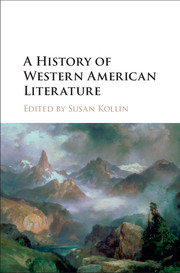Book contents
- Frontmatter
- Contents
- Notes on Contributors
- Acknowledgments
- Introduction: Historicizing the American Literary West
- PART I HOMELANDS
- PART II MAKING A REGION
- 3 Domestic Frontiers: Settler Narratives by European American Women Writers
- 4 Labor and the Land: Narratives of Trading, Mining, and Ranching
- 5 Nature Writing and the American West
- 6 Tall Tales and Short Stories
- 7 The Popular Western
- PART III GEOGRAPHIES OF THE LITERARY WEST
- PART IV THE TWENTIETH CENTURY AND BEYOND: LITERARY MOVEMENTS AND CRITICAL PERSPECTIVES
- Selected Bibliography
- Index
3 - Domestic Frontiers: Settler Narratives by European American Women Writers
from PART II - MAKING A REGION
Published online by Cambridge University Press: 05 November 2015
- Frontmatter
- Contents
- Notes on Contributors
- Acknowledgments
- Introduction: Historicizing the American Literary West
- PART I HOMELANDS
- PART II MAKING A REGION
- 3 Domestic Frontiers: Settler Narratives by European American Women Writers
- 4 Labor and the Land: Narratives of Trading, Mining, and Ranching
- 5 Nature Writing and the American West
- 6 Tall Tales and Short Stories
- 7 The Popular Western
- PART III GEOGRAPHIES OF THE LITERARY WEST
- PART IV THE TWENTIETH CENTURY AND BEYOND: LITERARY MOVEMENTS AND CRITICAL PERSPECTIVES
- Selected Bibliography
- Index
Summary
Traditionally scholars who write about the women who settled the American West have organized their work geographically, focusing on area or region, territory or state. While effective, such an approach presumes regions, territories, and states to be self-evident categories that produce unique place-based subjectivities. Here I will focus not on the places of women's writing, but on how discourses of home, family, and domesticity underwrite the spatializing projects of settler colonialism. Under such an approach, the tenuous nature of Western as signifying “trans-Mississippi” becomes apparent, and the repeated phrase “first white woman” points our attention to earlier moments that demonstrate gender's importance to state-making processes.
Settler colonists occupy and develop places already inhabited; whether they remain or depart, their settlements ensure the area's possession by a non-indigenous polity. As Ashley R. Sanders observes, such “colonists … articulated two contradictory desires – one for autonomous settler government [and] the other for metropolitan resources and military [protection] and support.” In asserting their autonomy, colonists often craft collective identities (Jayhawks, Sooners, Texans) that distinguish them from indigenes, metropolitan sponsors, and/or supervising polities. Often they relate this new identity to their shared place-based experiences of settlement, which quickly become mythologized. Through this lens, narratives of independent emigrants, impoverished but virtuous squatters, and gentle tamers whose courage founded a nation become part of a larger project of state consolidation. Thus literary historical undertakings and even primary written sources are discursive means of creating and transmitting domestic frontier identities.
Here I will consider how texts by and about women document the means by which polities acquire land, direct its settlement, and govern the resulting nascent political units. Large portions of the present-day continental United States were purchased from Indigenous sellers or ceded through diplomatic negotiation. Other areas became U.S. properties through acts of war, by treaty, and/or by annexation. Incentives to settlement included legal initiatives such as the Northwest Ordinance, which transmuted royal land grants into federal properties that could be sold to immigrants, consolidated as territories, and eventually added to the nation as states. Capital investments underwrote settlement of these lands. Lewis and Clark, Zebulon Pike, and others led federally sponsored expeditions to explore routes for commerce and evaluate the land's potential to support settlers.
- Type
- Chapter
- Information
- A History of Western American Literature , pp. 49 - 64Publisher: Cambridge University PressPrint publication year: 2015
- 2
- Cited by

